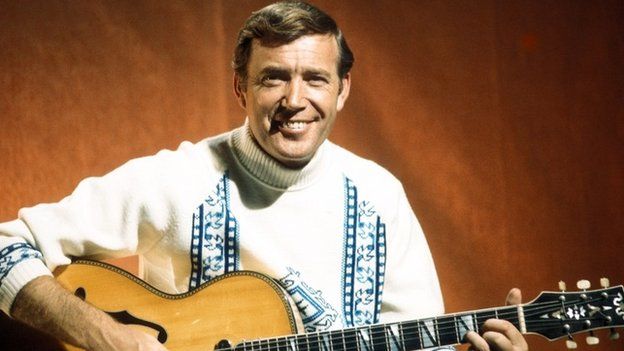Obituary: Val Doonican
- Published

Val Doonican's gentle style made him a popular feature on Saturday night television for more than two decades.
He became famous for his sweaters and the rocking chair in which he invariably sat to sing the final number of his show.
At a time when the 60s pop explosion was stalling the careers of so many crooners, Doonican bucked the trend with eight Top-20 hits.
And songs like Delaney's Donkey and Paddy McGinty's Goat allowed record-buyers to indulge themselves in a touch of Irish-flavoured whimsy.
Michael Valentine Doonican was born in the Irish city of Waterford on 3 February 1927, the youngest of eight children.
His father died of cancer when he was 14 and he was forced to leave school and work in a packaging factory to supplement the family income.
He wrote music from a very young age, and formed a singing group with his friends when he was just 10.
With his guitar, he later took part in the town's first ever television broadcast and, after his first paid engagement at the Waterford fete, left his factory job to tour the country in a caravan.
In 1951, Doonican was invited to join a group called the Four Ramblers.
The band toured England where Doonican was introduced to the joys of golf, and also to his future wife, the cabaret star Lynnette Rae.
Doonican later moved to London, where he continued his entertainment apprenticeship in radio, television, cabaret and music hall.
Idols
He recalled that "it took 17 years to become an overnight success", when his appearance on Sunday Night at the Palladium prompted the BBC to offer him his own series in 1964.
He was given an initial series of six half-hour programmes which were broadcast live from a BBC studio in an old chapel in Manchester.
The Val Doonican Music show saw him become a mainstay of Saturday night television.
But he was always grateful that his career gave him the opportunity to meet his idols such as Bing Crosby and Howard Keel.
"You can't imagine," he later recalled, "that you're going along in your young life, buying records of people that you think are fantastic and, in my case, I ended up singing duets with them on my show."
The comedian Dave Allen also got his big break by appearing on the show.
In the 1970s, his fame spread when the programme was transmitted overseas.
Two of Doonican's most enduring props were his collection of multi-coloured sweaters - which became known as "Val Doonican jumpers" - and his ever-present rocking chair.
Hits
In fact, the star swapped his sweaters for jackets back in 1970, so remained bemused when people everywhere continued to ask him where his jumper was.
Doonican went on to record more than 50 albums, and he appeared several times on Top of the Pops.
At a time when the charts were dominated by pop groups he had a string of hits including Special Years, Walk Tall and What Would I Be?
The television shows came to an end after 24 years, but Doonican continued to tour, choosing mostly intimate regional theatres, in the UK and abroad.
He eschewed television appearances, preferring to share his time between Buckinghamshire and Spain, and to spend his semi-retirement playing golf.
"Golf is like an 18-year-old girl with big boobs," he once said. "You know it's wrong but you can't keep away from her."
His other great hobby was painting, and his work was exhibited around the country.
A lot of his art was inspired by his Irish homeland, where he remained revered for his modest charm and embrace of original Gaelic values.
In 2001, Doonican and his wife returned to Waterford to receive the gift of a rocking chair.
The ever humble entertainer exclaimed that it "celebrated all the special things to come my way since leaving the city 47 years ago".